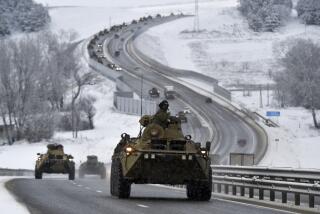Oil Ministers Once Again Will Try to Stabilize Prices
- Share via
RIYADH, Saudi Arabia — A group of oil ministers will try again this weekend to fashion what has become an ever-elusive strategy to boost sagging oil prices.
The meeting Sunday in Riyadh of the Gulf Cooperation Council, which includes ministers from six Persian Gulf nations, comes amid a backdrop of price-war threats and roller coaster prices that sometimes have dropped as much as $8 below the $18-a-barrel benchmark for crude.
In New York, speculation that OPEC members would agree on production cuts sent prices soaring Friday in the oil futures market.
The November contract for West Texas Intermediate, the benchmark grade of U.S. crude oil, shot up 71 cents a barrel to settle at $14.92 on the New York Mercantile Exchange. The contract had briefly traded below $12.30 a barrel as recently as last week.
“Within the GCC, we must have one strategy, one oil policy,” said GCC Secretary-General Abdullah Bishara of Kuwait.
GCC members include Saudi Arabia, Kuwait, Qatar, the United Arab Emirates, Bahrain and Oman. With the exception of Bahrain and Oman, each nation is a member of the Organization of Petroleum Exporting Countries.
OPEC has been trying to reign in production by its 13 member states in an effort to boost oil prices.
Oil industry executives estimate that during August, GCC nations along with Iran and Iraq accounted for 13 million barrels a day of OPEC’s 20-million-barrel daily output. Had the nations adhered to their designated OPEC production quotas, the outflow would have been 10.5 million barrels a day.
Quotas Ignored
Iraq and Iran ignored their OPEC quotas to finance their 8-year-old war. Although a cease-fire went into effect Aug. 20, both sides have insisted that they be allowed to produce as much as needed to finance reconstruction.
A Western diplomat, speaking on condition of anonymity, said the Gulf states “will have to find some way of helping Iran and Iraq, otherwise they will just keep producing.”
Iraq has hinted that it will accept an OPEC production ceiling to bolster prices. It is producing about 2.7 million barrels a day against a quota of 1.5 million barrels a day. Iran’s output is pegged at about 2.5 million barrels a day, slightly above its 2.36-million-barrel quota. Damage to its facilities prevents higher output.
More to Read
Sign up for Essential California
The most important California stories and recommendations in your inbox every morning.
You may occasionally receive promotional content from the Los Angeles Times.













